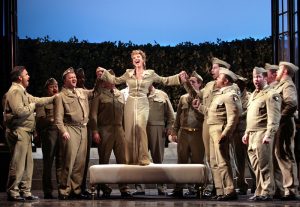Tenor Stephen Costello Returns to San Diego Opera
The image of the barrel-chested, horn-helmeted, sword-swinging opera singer dies slowly. Making opera less exotic and more believable is a preoccupation of opera companies and singers around the globe.
San Diego Opera will open its 2013 season with a smartly updated production of Gaetano Donizetti’s comic opera The Daughter of the Regiment, transforming its garrison of French soldiers stationed in a quaint Swiss mountain village at the turn of the 19th century to a platoon of American GI’s in France during World War II. “When I was given my costume,” said tenor Stephen Costello, “I thought, ‘I haven’t dressed like this since high school when I played Lieutenant Cable in South Pacific.’ “
Not that high school was that long ago for the 31-year-old opera singer, whose casual, low-key demeanor allows him to blend in easily with the young coffee house denizens huddled over their Apple laptops and I-pads. And, yes, he uses Twitter but prefers to communicate with his fans on Facebook.
“There are lots of people out there who support you, and it feels good to get their feedback about a performance,” he said. Such contacts, however, occasionally provide more than reassuring ego massage.
“Once when I was performing in Seville, Spain, I was ill, and a Facebook fan there helped me find a doctor, which I really appreciated.”
Costello observed that the internet has vastly increased the amount of opera criticism readily available.

San Diego Opera’s “Daughter of the Regiment” production (photo courtesy of Washington National Opera)
“If you read one, you have to read them all, and if you believe one, then you have to believe them all,” he noted.
But on whose judgement does he actually rely?
“I have just four people in my life I listen to for feedback on my performance, and I chose them specifically because they have nothing to gain [financially] from my work: my voice teacher, my coach and two other advisors.” (The difference between a voice teacher and a vocal coach is that former works essentially on vocal technique and the latter concentrates on interpretation and linguistic subtleties.)
And while he observes other singers, he never asks their opinions about his performance, nor does he offer his views on theirs.
“Opera is a very small world, and you will be working with these people over your entire career. You have to walk a very fine line around other singers.”
Unlike some opera singers who toil in obscurity in tiny European houses before they are “discovered,” Costello went directly from completing his studies at the Philadelphia Academy of Vocal Arts to the stage of the Metropolitan Opera, where he sang Arturo in another Donizetti favorite, Lucia di Lammermoor, for the opening production of the Met’s 2007-2008 season. It certainly did not hurt that he had won first place in the 2006 George London Foundation for Singers Competition and debuted that year in regional American opera companies.
San Diego audiences know Costello from his San Diego Opera debut in 2010 as Romeo in Romeo and Juliet, where he sang with his wife, soprano Ailyn Perez. Costello returned for two operas in the 2011 season, portraying the Singer in Der Rosenkavalier and Faust in Faust.
Although he did not sing in San Diego Opera’s 2011 production of Jake Heggie and Gene Scheer’s Moby-Dick, he did originate the role of Greenhorn in the 2010 Dallas Opera premiere of Moby-Dick and reprised Greenhorn in San Francisco Opera’s production of the opera in the fall of 2011. Costello said that the Dallas cast knew from the first hearing of the score with mere piano accompaniment that they had a great property on their hands.
“In Dallas, the cast became a family, hanging out together even in our free time. We ignored all the union rules about [the limits of] rehearsal time, sometimes sitting around taking notes from Jake and Gene until 12:30 in the morning.”
Although Costello praised Heggie for writing greatful vocal lines for the singers, the staging demands of Moby-Dick proved particularly challenging. He had to sing one of his extended duets with Queequeg, sung by the tattooed Samoan bass Jonathan Lemalu, harnessed into rigging atop a mast some 15 feet above the stage.
“Fifteen feet may not seem like a lot, but from that vantage point it appears that you are level with the third balcony, and that was scary.”
Acrophobic concerns aside, it also put the singers in the masts much further from the sound of the orchestra in the pit below the stage and certainly further rom the conductor’s baton. Fortunately, monitors hidden in the scenery gave the suspended singers contact with the direction from the pit.
Costello added that his Heggie connection was not about to dissolve now that Moby-Dick has completed its initial performances with the five companies that commissioned it.
His wife Ailyn will be singing in Heggie’s newest opera, Great Scott, another commission for Dallas Opera, which is slated to open that company’s 2015-16 season. Working in different cities is a fact of life for this operatic couple, but they are seldom out of communication.
“She sends me at least 40 tweets a day,” he said with a wry combination of satisfaction and exaspiration.
[box] San Diego Opera’s “The Daughter of the Regiment” opens Sat., Jan. 26, 2013, at 7:00 p.m.; continuing Tue., Jan. 29 at 7:00 p.m., Fri., Feb. 1 at 7:00 p.m., and Sun., Feb. 3 at 2:00 p.m.. [/box]

Ken Herman, a classically trained pianist and organist, has covered music for the San Diego Union, the Los Angeles Times’ San Diego Edition, and for sandiego.com. He has won numerous awards, including first place for Live Performance and Opera Reviews in the 2017, the 2018, and the 2019 Excellence in Journalism Awards competition held by the San Diego Press Club. A Chicago native, he came to San Diego to pursue a graduate degree and stayed.Read more…



